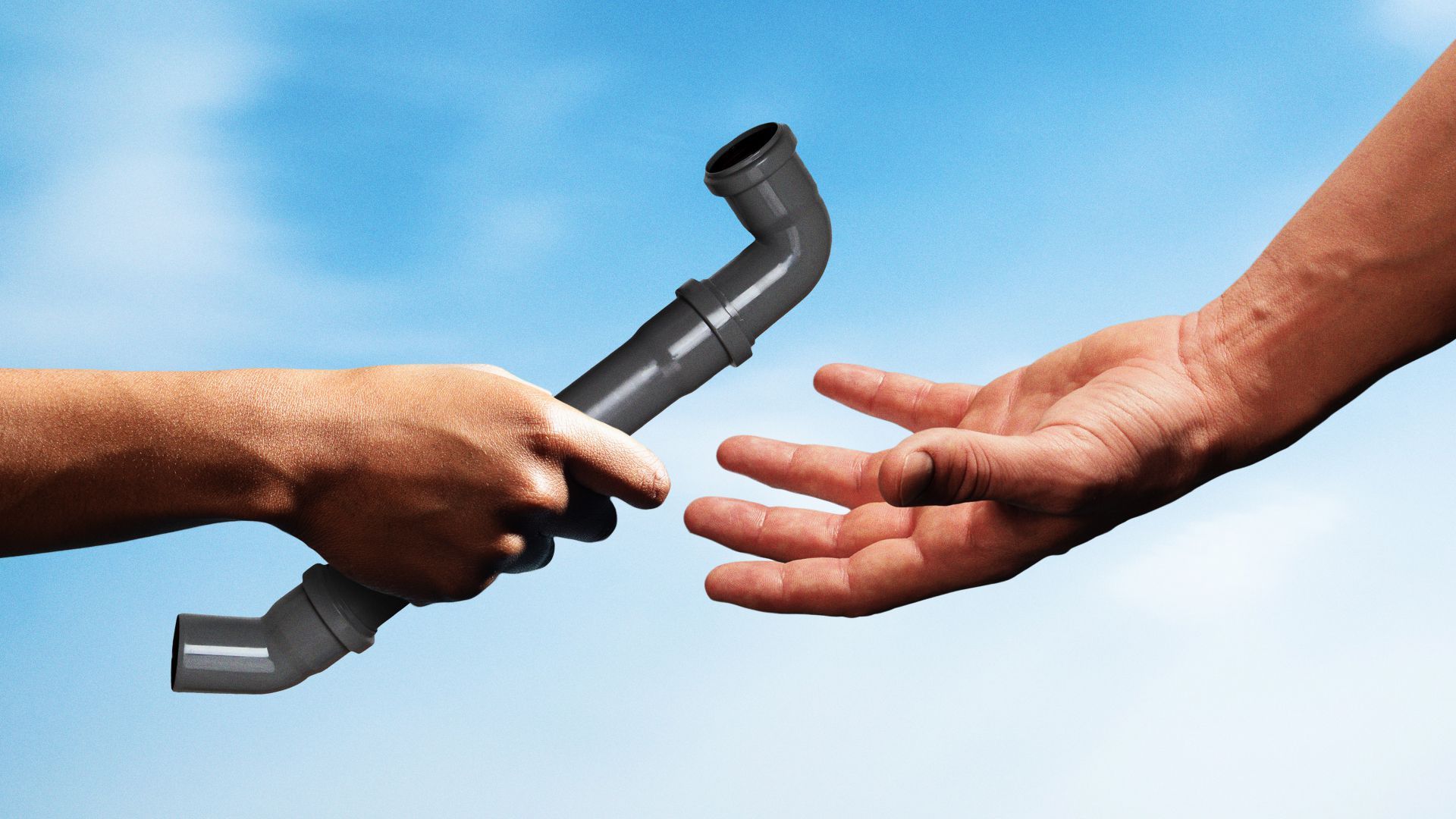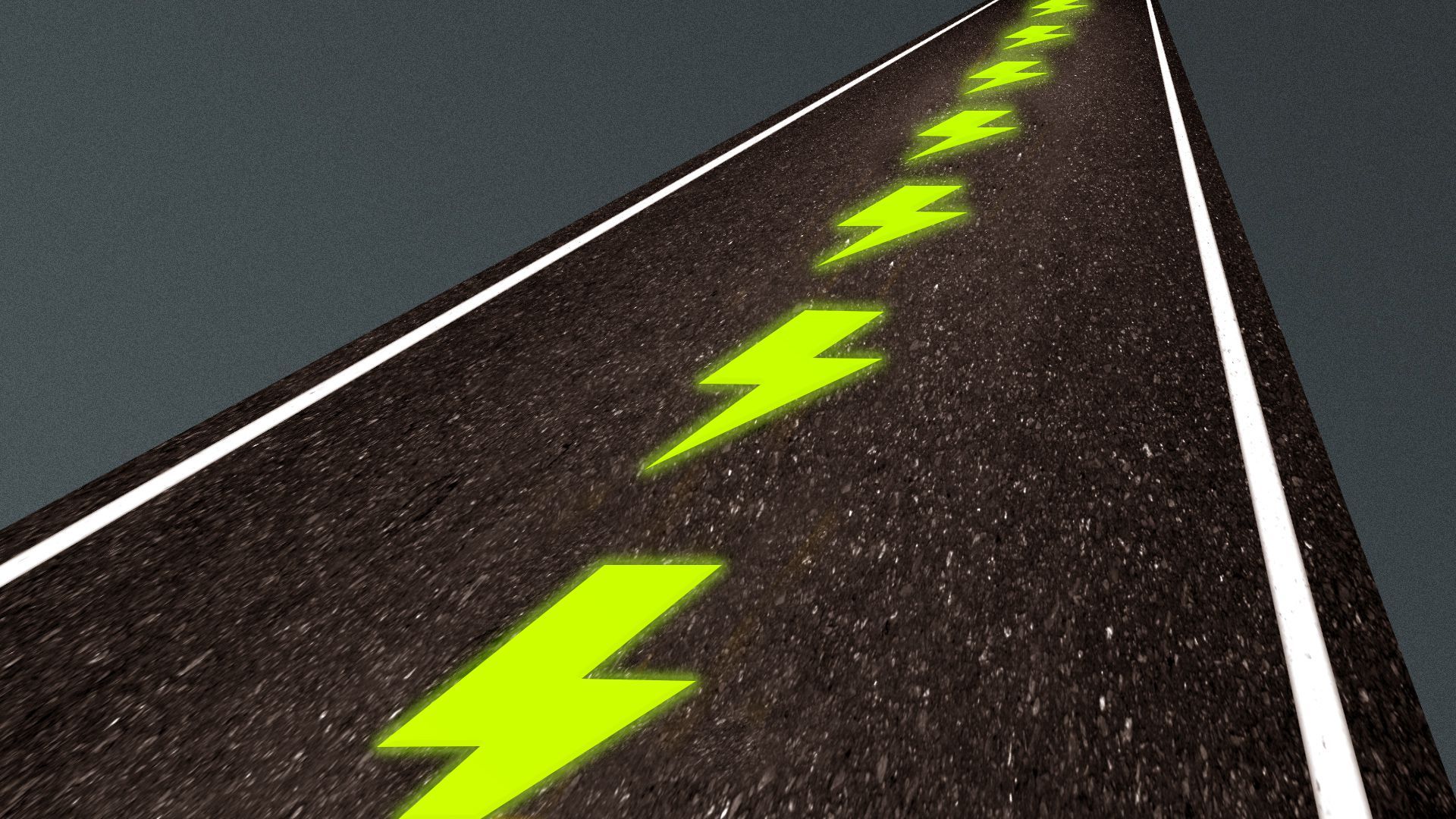| | | | | | | | | | | Axios Generate | | By Ben Geman and Andrew Freedman · Sep 07, 2022 | | 🐪 Wait, Wednesday already? Today's newsletter, edited by Mickey Meece, has a Smart Brevity count of 1,157 words, 4.5 minutes. 📬 Did a friend send you this newsletter? Welcome, please sign up. 🎶 Today marks 35 years since Pet Shop Boys released the album "Actually," so those pop craftsmen have today's intro tune... | | | | | | 1 big thing: California's worst September heat wave tests grid |  Data: The Applied Climate Information System (ACIS)/Climate Central; Note: Summer refers to June 1 to Oct. 1; Chart: Axios Visuals California's worst September heat wave is putting its electricity grid through a big test. It held up Tuesday evening, with no rolling blackouts, Andrew writes. Why it matters: Heat waves are becoming more intense, more frequent and longer-lasting due to human-caused climate change, and such events are stressing energy infrastructure in new ways. The big picture: California is seeking to move rapidly off fossil fuels, having just passed a slew of climate-related measures, including a ban on internal combustion engine-powered vehicles beginning in 2035. - A large-scale grid failure during an unprecedented heat wave could call into question the state's progressive policy agenda, including its overall energy transition strategy.
- In addition, it could create political headaches for Gov. Gavin Newsom (D), a politician with national ambitions.
- California's grid operator sought to avoid a repeat of rolling outages in August 2020, affecting about 800,000 homes and businesses, instead aiming for smaller interruptions if needed.
Zoom in: Since that event two years ago, California has moved to add generating capacity and battery storage as well as put in place electricity import agreements from nearby states. - Much of the additional generating capacity that has been switched on is powered by natural gas, a fossil fuel that the state aims to move away from.
- The state is seeking cleaner options, including deals for battery storage that can release renewably-generated power into the grid during peak times.
- The California ISO, the state's grid operator, has leaned on these strategies the past few days. In addition, the state has spotlighted demand-side measures to cut electricity use during peak use periods, between about 4 and 9pm local time.
Between the lines: In its analysis of the 2020 outages, officials concluded that climate change impacts require speeding up the incorporation of better grid planning and more electricity generation. - Climate scientists have little doubt that climate change is worsening the current heat wave.
- "We really don't need to attribute most heatwaves individually anymore. The answer is always the same, we made them hotter," Michael Wehner, a climate researcher at the Lawrence Berkeley National Laboratory, told Axios via email.
- Friederike Otto, a leading scientist working on extreme event attribution at Imperial College London, told Axios that the rate of change in extreme heat events will be key, including the questions: "How fast are hot extremes getting worse with global warming, and can our adaptation keep up with it?"
The bottom line: It is that last question, whether we can keep adapting our infrastructure to the shifting climate, that is likely to keep California power officials up at night long after this heat wave ends. |     | | | | | | Bonus: California's records fall | | An astonishing number of heat milestones were set in California and other western states yesterday, with more extreme temperatures to come this week. Some of the most noteworthy records: - 117°F: Ukiah, tying an all-time record.
- 116°F: Downtown Sacramento, an all-time record.
- 125°F: Death Valley, a monthly record and one-degree short of the global record for September.
- 115°F: Santa Rosa, an all-time record.
- 109°F: San Jose, an all-time record.
- 114°F: Napa, an all-time record.
- 115°F: Stockton, tying the all-time record.
- 114°F: Fresno, a monthly record.
What's next: More record heat is forecast for the rest of the week, though fewer all-time milestones are likely to be set compared to yesterday before the heat dome gradually weakens. |     | | | | | | 2. How an oil giant is funding its transition |  | | | Illustration: Maura Losch/Axios | | | | Repsol, the huge Spain-based multinational player, is selling a 25% stake in its exploration and production business to the private equity firm EIG in a $4.8 billion deal, Ben writes. Why it matters: Repsol cast the deal announced this morning as a way to help finance its diversification and climate goals. - The plan "allows us to maintain the strategic direction of the upstream unit and, at the same time, to boost the transformation of the company and its multi-energy profile to achieve zero net emissions by 2050," Repsol CEO Josu Jon Imaz said in a statement.
- EIG said the deal provides upfront capital to support the growth of Repsol's renewable power and fuels divisions and "circular products."
The intrigue: Bloomberg notes that while cash-rich European oil giants are weighing how to boost their transition efforts, Repsol's deal "contrasts with the approach of other oil majors, which are so far resisting pressure to sell off parts of their traditional businesses." |     | | | | | | A message from Chevron | | At Chevron, we're working to keep up with growing energy demand | | |  | | | | Chevron is increasing U.S. production to keep up with growing energy demand. By the end of this year, we plan to increase our oil and natural gas production in the Permian Basin by 15% over 2021 levels. And we're expected to reach 1 million barrels of oil per day by 2025. Learn more about our efforts. | | | | | | 3. 🏃🏽♀️Catch up fast on Europe's energy crisis | | 🛢️ "President Vladimir Putin said on Wednesday that Russia will stop supplying gas and oil if price caps are imposed, while the European Union faced divisions on how to respond to a deepening energy crisis." (Reuters) ⚡"Brussels is working on a €200 a megawatt hour price limit for electricity generated by non-gas power producers as part of efforts to quell the EU's energy crisis." (Financial Times) 🏭 "More than 90% of German companies view the rising energy prices as a serious or even existential threat to their businesses, according to a survey of the influential business lobby group BDI." (Bloomberg) |     | | | | | | 4. What's new in electric vehicle tech |  | | | Illustration: Gabriella Turrisi/Axios | | | | ☀️ Lightyear, a Dutch solar electric car startup, raised $80 million led by Invest-NL. - Why it matters: The company said the financing helps it keep momentum toward beginning production this year of the Lightyear 0.
- The big picture: The vehicle supplements plug-in charging with solar panels that Lightyear says provide up to 43 miles per day of range. TechCrunch has more.
🔋 Ionic Mineral Technologies emerged from stealth mode yesterday, touting products to replace graphite in lithium-based batteries used by electric vehicles, Axios' Alan Neuhauser reports. - Zoom in: The Utah-based startup says it's developing its nano-silicon material naturally, by mining halloysite. The mining approach is meant to bring the cost of the nan0-silicon lower than if it were made synthetically. Subscribe to Axios Pro Climate Deals to read the whole story.
🚛 Battle Motors raised $150 million in Series B finance from an unnamed institutional investor to boost its truck electrification work, it said. The company says it hopes to "lead the electrification of the vocational fleet truck industry." |     | | | | | | 5. Charting the political gap in climate |  Data: Pew Research Center; Chart: Simran Parwani/Axios Political divides over perceptions of climate risk are not solely a U.S. phenomenon, but Pew Research Center polling shows the gulf is wider than in other countries surveyed, Ben writes. The big picture: The chart above is one finding in a wider survey of 19 countries in North America, Europe and Asia-Pacific. Another finding: "In virtually every European country surveyed, concerns about climate change are lower among those who support right-wing populist parties than those who do not support these parties." Read the whole survey. |     | | | | | | 6. 🎧 Quote of the day | | "There is not a single person in the world who believes that we can actually decarbonize China, India, Brazil, South Africa, Eastern Europe at the scale and speed that we need to decarbonize them without nuclear." — Jigar Shah, head of DOE's loan office, speaking on the "Cowen Insights" podcastWhy it matters: The pod goes deep into his thinking about what it will take for regulators, industry and other stakeholders to get new reactor designs into commercial deployment. |     | | | | | | A message from Chevron | | At Chevron, we're working to keep up with growing energy demand | | |  | | | | Chevron is increasing U.S. production to keep up with growing energy demand. By the end of this year, we plan to increase our oil and natural gas production in the Permian Basin by 15% over 2021 levels. And we're expected to reach 1 million barrels of oil per day by 2025. Learn more about our efforts. | | | | 🙏Thanks for reading and we'll see you back here tomorrow. |  | | Why stop here? Let's go Pro. | | | | | | Axios thanks our partners for supporting our newsletters. If you're interested in advertising, learn more here.
Sponsorship has no influence on editorial content. Axios, 3100 Clarendon Blvd, Arlington VA 22201 | | | You received this email because you signed up for newsletters from Axios.
Change your preferences or unsubscribe here. | | | Was this email forwarded to you?
Sign up now to get Axios in your inbox. | | | | Follow Axios on social media:    | | | | | |








No comments:
Post a Comment